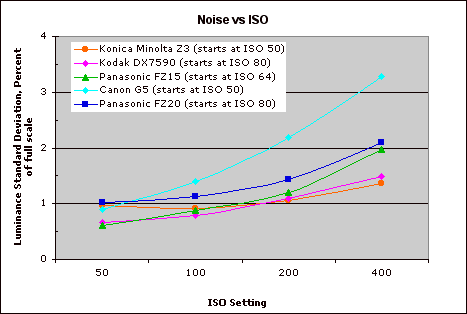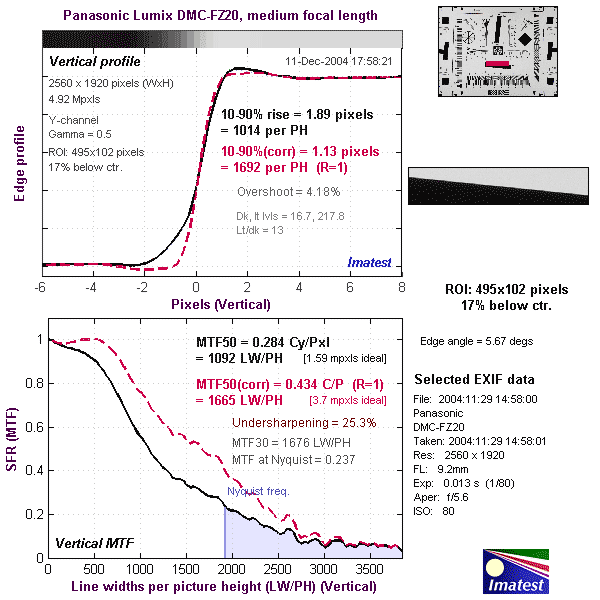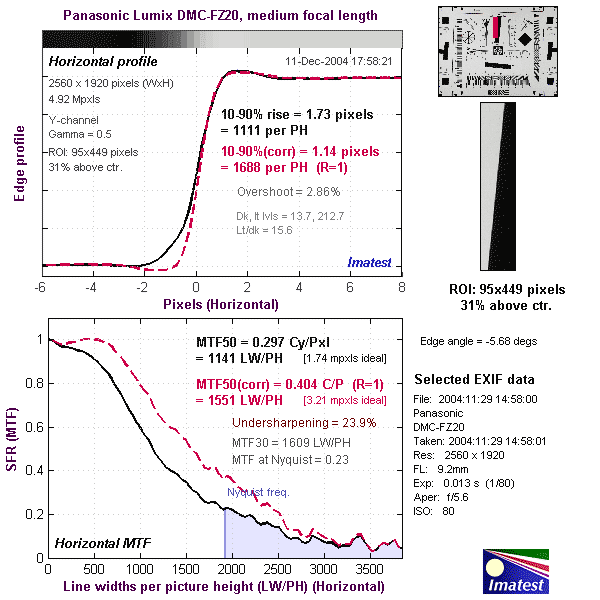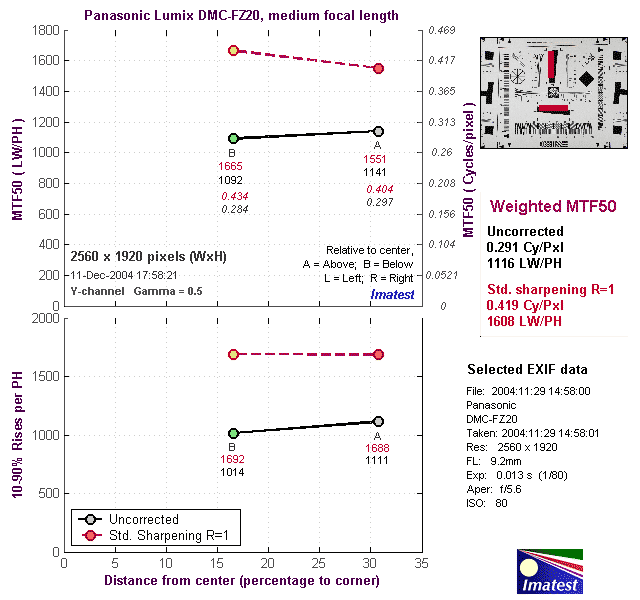Panasonic Lumix DMC-FZ20By: Dave EtchellsPanasonic introduces a five-megapixel digicam with the high quality optics of a 12x Leica lens. <<DMC-FZ20 Sample Images :(Previous) | (Next): Print-Friendly Review Version>> DMC-FZ20 Imatest ResultsReview First Posted: 12/17/2004 |
Detailed analysis of the Panasonic Lumix DMC-FZ20 images, from Imatest(tm)
I've recently begun using Norman Koren's excellent "Imatest" analysis program for quantitative, thoroughly objective analysis of digicam test images. I highly commend it to our technically-oriented readers, as it's far and away the best, most comprehensive analysis program I've found to date. (And with an introductory price of only $59, it's hard to beat.)
My comments below are just brief observations of what I see in the Imatest results. A full discussion of all the data Imatest produces is really beyond the scope of this review: Visit the Imatest web site for a full discussion of what the program measures, how it performs its computations, and how to interpret its output.
Here's some of the results produced by Imatest for the Panasonic FZ20:
Color Accuracy
For the most part, the Panasonic Lumix DMC-FZ20 has pretty good hue accuracy, but like many consumer-level digicams, tends to oversaturate its colors somewhat. The oversaturation is shown by the extent to which the circles (camera color) are displaced outward (higher saturation) relative to the ideal values (squares). On average, color saturation of swatches on the MacBeth ColorChecker(tm) chart are 114.6% of their ideal values. (An average oversaturation of 14.6%.)
Color here is generally pretty good, with the slight oversaturation that
most consumer cameras have. There are slight hue shifts in some colors, the
blues generally being pulled toward more purple tones, oranges being pulled
toward red, and reds pulled a bit toward purple. I think these color twists
are some of why the FZ20's skin tones tend to be on the yellowish side, but
I don't think the overall effect is too severe.
Color Analysis
These images show the color behavior of the Panasonic DMC-FZ20 directly. In each color swatch, the outer perimeter shows the color as actually captured by the camera, the inner square shows the color after correcting for the luminance of the photographed chart (as determined by a 2nd-order curve fit to the values of the gray swatches), and the small rectangle inside the inner square shows what the color should actually be, based on perfect rendering to the sRGB color space.
For me, the bottom line on the chart above is that the hue shifts mentioned earlier don't really have all that big an impact on the colors visually.
Gray Patch Tone and Noise Analysis

There's a lot in this particular graph, a lot more than I have room to go into
here. Bottom line, the Panasonic FZ20's noise levels are a little higher than
average across the board, but the noise spectrum is such that the noise is fairly
fine-grained.

This chart compares the Panasonic FZ20's noise performance over a range of ISOs against that of other cameras. As you can see, the Panasonic FZ20's noise levels are slightly higher than average across the board, but the increase relative to most of its competition is fairly minor. - The positive side of its high-ISO behavior though, is that the camera tends to hold onto detail in subject areas of subtle contrast better than some competing models do.
The chart above shows consolidated results from spatial frequency response
measurements in both the horizontal and vertical axes. The "MTF 50"
numbers tend to correlate best with visual perceptions of sharpness, so those
are what I focus on here. The uncorrected resolution figures are 1141 line widths
per picture height in the horizontal direction (corresponding to the vertically-oriented
edge), and 1092 along the vertical axis (corresponding to the horizontally-oriented
edge), for a combined average of 1116 LW/PH. Correcting to a "standardized"
sharpening with a one-pixel radius increases this number a fair bit, to an average
of 1608 LW/PH. These are good numbers for a 5-megapixel camera. (Interestingly,
the unadjusted numbers are nearly identical to those of the FZ15, suggesting
that you may not see a large difference in the FZ20's images without a little
post-capture sharpening in the computer.)
For the real techno-geeks, the two plots below show the actual edge response
of the Panasonic FZ20, for horizontal and vertical edges:




Follow Imaging Resource: